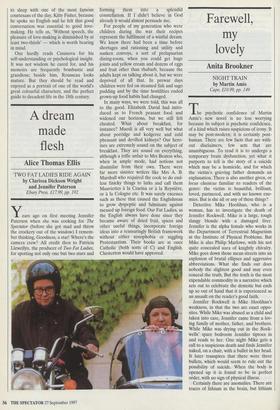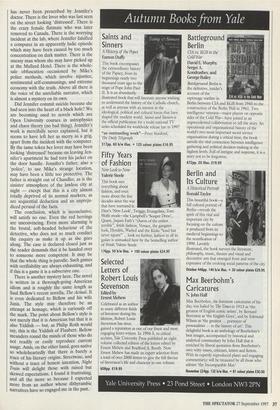Farewell, my lovely
Anita Brookner
NIGHT TRAIN by Martin Amis Cape, £10.99, pp. 149 The psychotic confidence of Martin Amis's new novel is no less worrying because its subject is psychotic confidence, of a kind which raises suspicions of irony. It may be post-modem; it is certainly post- human. There are few facts that are with- out disclaimers, few acts that are unambiguous. To read it is to undergo a temporary brain dysfunction, yet what it purports to tell is the story of a suicide which may be a homicide, and for which the victim's grieving father demands an explanation. There is also another given, or locus classicus familiar to readers of the genre: the victim is beautiful, brilliant, loved, partnered, and with no known ene- mies. But is she all or any of these things?
Detective Mike Hoolihan, who is a woman, has to investigate the death of Jennifer Rockwell. Mike is a large, tough slangy blonde with a damaged liver. Jennifer is the alpha female who works in the Department of Terrestrial Magnetism at the Institute of Physical Problems. But Mike is also Philip Marlowe, with his not quite concealed aura of knightly chivalry. Mike goes down those mean streets into an explosion of brutal ellipses and aggressive abbreviations. What she finds out does nobody the slightest good and may even conceal the truth. But the truth is the most expendable commodity in a narrative which sets out to celebrate the demotic but ends up so out of hand that it is experienced as an assault on the reader's good faith.
Jennifer Rockwell is Mike Hoolihan's weakness, in that the two are exact oppo- sites. While Mike was abused as a child and taken into care, Jennifer came from a lov- ing family of mother, father, and brothers. While Mike was drying out in the Rock- wells' spare bedroom Jennifer tiptoes in and reads to her. One night Mike gets a call to a suspicious death and finds Jennifer naked, on a chair, with a bullet in her head. It later transpires that there were three bullets, which would seem to rule out the possibility of suicide. When the body is opened up it is found to be in perfect order, with no sign of physical illness.
Certainly there are anomalies. There are traces of lithium in the brain, but lithium has never been prescribed by Jennifer's doctor. There is the lover who was last seen on the street looking 'distressed'. There is the crazy female flatmate who was later removed to Canada. There is the worrying incident at the lab, where Jennifer falsified a computer in an apparently ludic episode which may have been caused by too much concentration on dark matter. There is the uneasy man whom she may have picked up at the Mallard Hotel. There is the whole- sale obfuscation occasioned by Mike's police methods, which involve injustice, sentimental self-communings, and extreme economy with the truth. Above all there is the voice of the unreliable narrator, which is almost a mystery on its own.
Did Jennifer commit suicide because she had seen into the heart of a black hole? We are becoming used to novels which are Open University courses in astrophysics and chaos theory (no bad thing). Jennifer's work is mercifully never explained, but it seems to have left her as merry as a grig, apart from the incident with the computer. By the same token her lover may have been looking 'distressed' because on leaving Jen- nifer's apartment he had torn his jacket on the door handle. Jennifer's father, also a `police', to use Mike's strange locution, may have been a little too protective. The father is straight out of Chandler, as is the sinister atmosphere of the lawless city at night — except that this is a city almost totally deprived of its normal markers, as are sequential deduction and an unpreju- diced perusal of the facts. The conclusion, which is inconclusive, will satisfy no one. Even the red herrings are unconvincing. Even more alarming is the brutal, soft-headed behaviour of the detective, who does not so much conduct the enquiry as make it up as she goes along. The case is declared closed just as the reader demands that it be handed over to someone more competent. It may be that the whole thing is parodic. Such games with verifiability are always exhausting, and if this is a game it is a subversive one. There is another mystery here. The novel is written in a thorough-going American idiom and is roughly the same length as Saul Bellow's recent novella, The Actual. It is even dedicated to Bellow and his wife Janis. The style may therefore be an attempt at homage, which is curiously off the mark. The point about Bellow's style is not merely that it is American but that it is also Yiddish — but, as Philip Roth would say, this is the Yiddish of Flaubert. Bellow meanders round the minds of those who do not readily or easily reproduce current usage. Amis, on the other hand, goes native so wholeheartedly that there is barely a trace of his literary origins. Streetwise, and without a trace of honest intention, Night Train will delight those with raised but skewed expectations. I found it frustrating, and all the more so because I expected more from an author whose dithyrambic narratives have so engaged me in the past.











































































 Previous page
Previous page